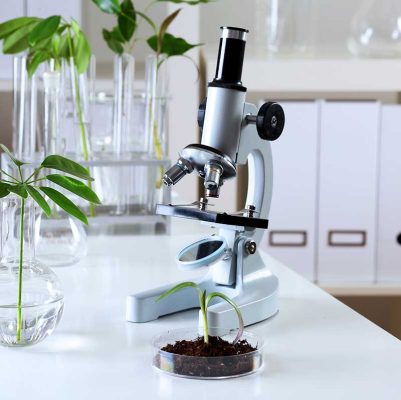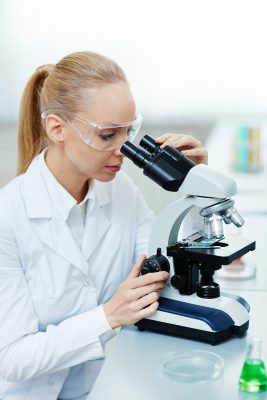is an MSc program exclusively specialized in symbiotic relations between micro and macro-organisms, but also between microorganisms. The role of animal and plant microbiomes is associated with interdisciplinary fundamental and applied scientific fields.
HosMic is implemented exclusively in English and for this it is open to international students while its participating tutors are well-established international researchers on organism microbiomes.

Title
Host-microbe interactions (strictly English taught).
Scientific Fields
Environmental Sciences – Agricultural Sciences – Biotechnology – Symbiotic Relations between micro- and macro-organisms and between microorganisms.
Programme Scope
The main scope of HosMic is the graduate specialization in fundamental and applied research processes of topics dealing with host-microbe interactions.
• Department of Ichthyology and Aquatic Environment (DIAE), School of Agricultural Sciences
• Department of Agriculture Crop Production and Rural Environment (DACPRE), School of Agricultural Sciences
• Department of Biochemistry and Biotechnology (DBB), School
of Health Sciences
Contemporary biology considers macroorganisms as entities inseparable from their internal and epibiotic microbial symbionts collectively referring to them as holobionts. According to the phylosymbiosis theory, the biology of a holobiont is characterized by an interdependence of the implicated parties to such degree that the evolution of the macroorganism cannot be accounted for without considering the co-evolution of its microbiomes. In fact, with regards to us humans, it is estimated that 37% of our genome is evolutionarily derived from prokaryotes. The holobiont concept includes the sum of prokaryotic and unicellular eukaryotic (microbiotic) species found at a microorganism. Microorganisms along with their sphere of influence form the microbiome. Life for macroorganisms without certain microorganisms and their functions is practically impossible, and interruptions in their ecophysiology might even lead to humanitarian crisis events.
Microorganisms develop symbiotic (e.g. commensalistic) relations with macroorganisms or may act allelopathically against them, while the initiation, the functionality and the termination of such relations is regulated by external factors and the biological traits of the implicated holobiont parties. Microorganisms are mostly important for the protection/defense, nutrition and well-being of their hosts, while their presence is sometimes necessary for the successful completement of their biological cycles.
Host-linked microbiome structure and function follows common principles among a broad range of animal and plant host organisms, while special mechanisms are developed in particular host organism cases. Those biological relations may be partly dictated by macroecological relations, whereas there are opened questions in particular cases. However, the continuous technological progress which started a couple of decades ago, and which involves multiple scientific fields, is synched with microbiome discoveries resulting in a high-speed innovation progress in that field. Finally, current microbiome study is by nature integrated, involving fields like microbiology, ecology, genetics, evolution, bioinformatics and statistics and thus demands from students in a high degree the development of critical attitude towards experimental design, analysis and presentation of associated research outcomes.
Beyond higher animal and plant hosts, recent research based on omics approaches has revealed tri-partite relations between plants-fungi-bacteria (e.g. plants-mycorrhizae-fungal endosymbiotic bacteria), or plants-fungi-insects, and also relations of viruses with other micro-/macro-organisms. Besides these we are aware of microbe-microbe interactions that were developed within the context of reciprocal rewards, or as parasitic between pray and predator. The study of the above, their governing principles, and the evolutionary relation between organisms interacting with each other, are state of the art study fields in microbial ecology and microbiology. Moreover, the study of the function of plant and animal responses under the prism of their consideration as holobionts instead of independent entities, is constantly gaining ground in associated literature, delineating the role of associated interactions in both host ecophysiology and its applied aspects like e.g. plant and animal production.
HosMic, mainly through the understanding of the described research processes, aims at the specialization of its graduates in topics
concerning: a) the structure, the functioning and regulation of plant and animal microbiomes; b) the interactions of microbiomes with their
hosts; c) the interactions between microorganisms (particularly the symbiotic ones); d) the understanding of the regulatory mechanisms
governing these interactions, and the overall holobiont homeostasis; e) the role of abiotic factors in these interactions.
HosMic graduates are expected to be capable to study the composition, the structure, the metabolic profile and functional traits of symbiotic
microbiomes, and to identify and study hosts within the holobiont context. They are expected to be able to develop strategies and interventions for the exploitation of holobiont interactions in applications in the environment, agriculture and the health of higher animal organisms. The MSc aims are realized through advanced and up-to-date courses on contemporary science of symbiotic microbiomes and research activities on topics of macro-/micro-organisms. The MSc graduates will have the necessary skills for a successful career in the private, public, academic and research sectors in fields like: research and development (RD) or production of agrochemicals (e.g. pesticides, fertilizers); development and maintenance of plant propagating material; field of biotechnological products; field of veterinary products; field of pharmaceuticals and cosmetics; field of environmental design, management and restoration.

HosMic will accept fifteen (15) students each academic year. The students have to be graduates of national and peer international Universities, as well as Technical Institutions of the following study fields:
• Biology, Biochemistry and Biotechnology, Molecular Biology and Genetics, Biological Applications and Technology, Computational Biology and associated fields.
• Agricultural Sciences
• Environmental Sciences
• Diet and Nutrition
• Food Technology
• Chemistry, Chemical Engineering, Environmental Engineering and associated fields
• Veterinary Science
HosMic is parted by 1 academic year or 2 academic semesters that include the attendance and successful examination in five (5) courses followed by the research diploma thesis. The minimal MSc duration is 1 calendar year. The total sum of European Credit Transfer and Accumulation System (ECTS) units necessary for the MSc diploma acquisition are 75. An extension of 6 more months can be provided if deemed necessary (to a total duration of 18 moths).

UTh-DIAE, UTh-DACPRE and UTh-DBB share the necessary classroom, laboratory and library infrastructure and the necessary equipment for the undisrupted MSc performance.
The infrastructure exists at the buildings of the School of Agricultural Sciences in Nea Ionia of the city of Volos and the Department of Biochemistry and Biotechnology, at Viopolis, of the city of Larisa in the Prefecture of Thessaly.
The three departments have fully equipped classrooms (that can fit more students than those admitted in the MSc) and laboratories used by the tutors for the teaching and research of their fields teaching like microbiology, molecular biology, biotechnology, instrumental analytics, fisheries, greenhouses, bioinformatics. The tutors are willing to be involved in the MSc at levels beyond their legal obligations for achieving the MSc goals.

The HosMic MSc program does not foresee the administration of scholarships. However, its students are free to receive external to the MSc program scholarships.
The tuition fees are 3.600,00 € per student for each study cycle. According to Greek laws (Ν. 4485/2017, art. 35, par. 2), it is possible to exempt from the tuition fees, and at no more than 30% of the admitted students, students whose “individual income, in case they do earn income, and their family available equivalent income, do not exceed, the individual income the 100%, and the family income the 70% of the national median equivalent income, according to the most recent each year published statistics of the Greek Statistics Authority. This tuition fee exemption is provided only for a single MSc program”.
Moreover, according to the paragraph 3 of article 35 of Ν. 4485/2017, “the application for exception from tuition fees is submitted after the completion of the selection process of the students of the MSc program. The financial status is by no means a selection criterion for an MSc program. Students that receive a scholarship from another source, are not entitled a tuition fee exemption”.
The percentage of tuition fee exemptions is estimated to reach up to 30% of the total admitted students of every MSc programme cycle as dictated by the associated law Ν. 4485/2017.
